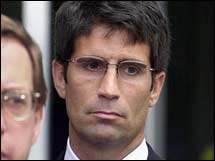 The NY Times’ Landon Thomas, Jr. — whose interesting article on former Merrill Lynch executive Nigerian Barge defendant Daniel Bayly was highlighted in this previous post — scores again today with this fascinating article on Michael J. Kopper, the former Enron executive who orchestrated along with with former Enron CFO Andrew Fastow the effective embezzlement of millions from Enron through the company’s transactions with special purpose entities (“SPE’s”) that the two controlled.
The NY Times’ Landon Thomas, Jr. — whose interesting article on former Merrill Lynch executive Nigerian Barge defendant Daniel Bayly was highlighted in this previous post — scores again today with this fascinating article on Michael J. Kopper, the former Enron executive who orchestrated along with with former Enron CFO Andrew Fastow the effective embezzlement of millions from Enron through the company’s transactions with special purpose entities (“SPE’s”) that the two controlled.
Despite Kopper’s role in orchestrating the embezzlement and the resulting breach of market trust that ultimately led to Enron’s demise into bankruptcy, Mr. Thomas notes that Kopper’s plea bargain with the Enron Task Force is likely to result in a relatively light prison sentence, perhaps even probation.
One has to wonder how former Enron chief accountant Richard Causey — who didn’t receive a penny from the tens of millions that Fastow and Kopper embezzled from Enron — feels about that turn of events. Larry Ribstein comments along those same lines here.
Given the societal bias against all things related to Enron, it’s easy to overlook the key role that Kopper had in Enron’s collapse. A good case can be made that the true criminal acts at Enron were limited to Fastow, Kopper and a relatively small group of their underlings who also profited from the transactions between Enron and the SPE’s that Fastow and Kopper controlled.
The original concept of the SPE’s — before Fastow and Kopper hijacked them — was actually sound and creative.
With equity owned primarily by investment banks and other financial institutions, the SPE’s were initially intended to be private equity funds with completely separate management from Enron. The main attraction of the SPE’s for investors was the funds’ preferred right to invest in Enron assets, which benefited Enron by allowing the company to preserve liquidity and hedge risk.
Former Enron treasurer Jeff McMahon — who often clashed with Fastow over Fastow’s machinations with the SPE’s and ultimately lost his treasurer’s position because of those clashes — recruited a bright investment banker from Bankers Trust in London named Michael Jakubik in 1998 to run the SPE’s.
However, after Jakubik had moved to Houston to take the position of running the equity funds, Fastow engineered a last-minute coup in which he installed Kopper in the position with the SPE’s intended for Jakubik and directed McMahon to put Jakubik in another position with Enron.
That set the stage for Fastow and Kopper’s embezzlement from Enron using the SPE’s, the public disclosure of which triggered the the breach of trust that caused the markets to turn on Enron.
Mr. Thomas’ colleague at the Times, Kurt Eichenwald does a good job of describing the foregoing events on pp. 194-219 of his book on the Enron scandal, Conspiracy of Fools (Broadway 2005).

Tom,
How did you miss this story, which should have been your lead?
“Indicted Over San Diego Pension Scheme
# The former and current city officials face fraud charges in plan that has left a $2-billion deficit.
“SAN DIEGO ó A federal grand jury Friday indicted five former and current city pension board officials for their role in approving an investment scheme that has left the city struggling with a $2-billion pension deficit, the worst financial debacle in city history.”
Those of us who are long time opponents of federal power have been waiting for this perfect storm, created by the passage of 18 USC 1346 as interpreted by the 9th Circuit in United States v. Ely (holding that it is bank fraud for directors to do something stupid)
What is fascinating its that the defendants were charged with doing what the city asked them to do and that everything was spread in the public record (save for the securities fraud):
“At a board meeting in July 2002, Grissom, Saathoff and Lexin deceived other board members by pretending that Saathoff came up with an off-the-cuff solution when board members balked at the underfunding. It was actually a premeditated plan ñ even pre-approved by the City Council in closed session a few days before ñ as a contingency plan in case the first proposal was in trouble. Saathoff’s amended version, which on its face seemed more palatable to the board, was eventually adopted as Manager’s Proposal 2.”
What fascinates me is the argument that there is no loss associated with this crime. Pensions are not a free ride. Taxpayers must ultimately pay the bill. The argument would be that all the defendants did was adopt a plan that gave taxpayers a chance to avoid paying taxes, if the stock market worked.
How, really, does this “scheme” differ from the Bush tax cuts?
Moe
The corporate crime lottery, cont’d
Michael J. Kopper, who helped engineer the OBS partnerships that caused many of the problems for Enron, who made more than $16 million from these partnerships, which he spent on nice clothes and fast cars, who’s got a decent job